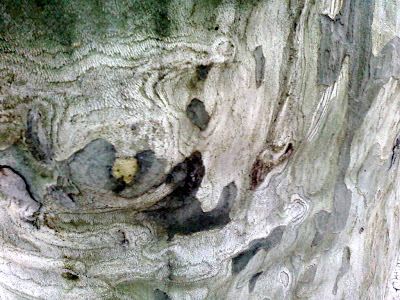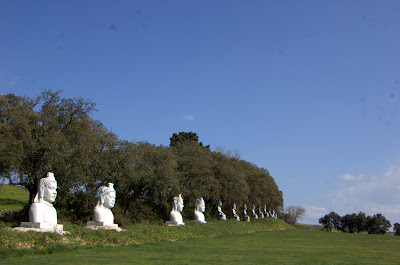
Thursday, April 1, 2010
yesterday

A tall elegant woman,
Passes me, smiling and singing to herself
Behind her coming from the same street corner
Comes a man, leaning on a cane, beautiful white beard,
Wide smile on his face and I think :
-This must be joy’s street corner.
During lunch, somebody says :
-It’s hard, getting out of bed every day,
Face the day, carrying this big void inside.
Better to move on, don’t spare a thought.
Somebody got broken,
Got so completely broken, that a new life
had to be reinvented, it’s sad but also
Beautiful and moving, teaching us all
How fragile our dead certainties are.
Wednesday, March 31, 2010
O dia de ontem

Uma mulher alta e elegante,
passa por mim a sorrir e a cantarolar,
atrás dela vindo da mesma esquina
surge um homem, apoiado numa bengala, bela barba branca,
com um sorriso largo no rosto e eu penso :
- Esta deve ser a esquina da boa disposição.
Ao almoço alguém comenta :
- Como é difícil, sair da cama todos os dias,
enfrentar o dia, levando este
tão grande vazio dentro.
O melhor é seguirmos em frente e nem pensar.
Alguém se partiu,
partiu-se tão completamente, que uma nova vida
teve de inventar, é triste mas ao mesmo tempo
comovente e belo, como todos podemos sempre
aprender quão frágeis são todas as nossas certezas.
color




Born in 1964, Keiko González studied first at the University of Texas and later at Rutgers University, where he was awarded the Fellowship for Excellence in the Visual Arts and attained his Master of Fine Arts. In 1992, he specialized in engraving at the Kunsthochschule in Dresden, Germany.
He has held fifteen individual exhibitions in Bolivia and the United States and has participated in more than twenty collective exhibitions on three continents. To name a few: Ru Artists, New York, Five young Bolivian artists in Rome; Circumstances, myth and abstraction in Bolivian contemporary art, IMF, Washington DC; Galerie Downingstrasse, Dresden, Entre trópicos, Museo de Arte Contemporáneo Sofía Imber, Caracas. His work has also been represented at international biennales in Cairo and Cuenca.
Among many awards, he has received the First Prize in Painting at the Salón Pedro Domingo Murillo in La Paz, Grand Prize at Recuperación del Dibujo, BHN, La Paz, Grand Prize at the XI Bienal de Santa Cruz, Bolivia, Grand Prize at Salón Internacional de Arte (SIART), La Paz and the First Prize at Salón 14 de Septiembre, Cochabamba, Bolivia.
His paintings have neither geographic adherences, nor artistic allegiances. They radiate freedom reached by a steady search on empty supports. From the early 1990s, Keiko´s works have been a constant dialogue between figuration and abstraction, with the predominance of the latter. In 1991, he displayed paintings made up by colourful abstract planes, which combined formal rigor with informal space. The powerful expressions bring to mind De Kooning´s works of the 1950s. These pieces appear to be the result of a random process, where the artist almost attacked the support with his media, only to cease when the true spirit of the painting had been revealed.
In 1992 he showed paintings which had subdued to the figurative, evoking women painted by Braque during his post Cubist period and Matisse’s recumbent figures. However, Keiko introduced them to an imaginative deconstruction of the aesthetic trend.
Between 1993 and 1994 he created organic shapes reminiscent of leaves, branches and sexual organs, which explore the picture plane in compositions that elude both a symbolic interpretation and a relationship with natural forms.
In recent years, he has been consistent in his quest for freedom and has continued to create works within the context of abstract art. The paintings displayed here were created in the field of two-dimensionality and that of three-dimensional space. Painted in acrylic, they range from a chromatic saturation of yellows, through cold blues, sombre blacks and nihilistic whites. His artistic conception engages tonalities with geometrical shapes, and chromatic planes with lines. The paintings restricted within wooden frames can be arranged randomly to create complex compositions, and allowing freedom of expression.
From the album:
"Keiko González" by ARTE BOLIVIANO CONTEMPORANEO on Facebook
the small clearing of each heart
"The main battlefield for good is not the open ground of the public arena but the small clearing of each heart." --Yann Martel, The Life of Pi
Labels:
Arvo Part,
Yann Martel
Tuesday, March 30, 2010
Tudo muda
Everything changes; nothing dies; the soul
Roams to and fro, now here, now there, and takes
What frame it will, passing from beast to man,
From our own form to beast and never dies.
Ovid
Tudo muda
Tudo muda. De novo começar
podes, com o último alento.
O que acontece, porém, fica acontecido: e
a água que pões no vinho, não podes mais
separar.
O que acontece, fica acontecido: a água
que pões no vinho, não podes
mais separar. Porém,
tudo muda: com o último alento podes
de novo começar.
Bertold Brecht
Roams to and fro, now here, now there, and takes
What frame it will, passing from beast to man,
From our own form to beast and never dies.
Ovid
Tudo muda
Tudo muda. De novo começar
podes, com o último alento.
O que acontece, porém, fica acontecido: e
a água que pões no vinho, não podes mais
separar.
O que acontece, fica acontecido: a água
que pões no vinho, não podes
mais separar. Porém,
tudo muda: com o último alento podes
de novo começar.
Bertold Brecht
Labels:
Bertolt Brecht,
Ovidio
Monday, March 29, 2010
All changes pass me like a dream

John Everett Millais
Ophelia
1851, Oil on canvas
76 x 111 cm
Tate Gallery, London
Love and Hate by Elizabeth Siddal
Ope not thy lips, thou foolish one,
Nor turn to me thy face;
The blasts of heaven shall strike thee down
Ere I will give thee grace.
Take thou thy shadow from my path,
Nor turn to me and pray;
The wild wild winds thy dirge may sing
Ere I will bid thee stay.
Turn thou away thy false dark eyes,
Nor gaze upon my face;
Great love I bore thee: now great hate
Sits grimly in its place.
All changes pass me like a dream,
I neither sing nor pray;
And thou art like the poisonous tree
That stole my life away.
Avó

A minha avó Maria Augusta.
As mulheres da minha vida têm-me trazido histórias...desde pequeno que adoro ficar quieto junto a elas a ouvi-las conversar. Ouvi algumas da minha avó Maria, mas ela partiu cedo, ouvi mais da minha avó Amélia, e das minhas tias. Com elas passei muitas tardes nos meus tempos de adolescente.
Subscribe to:
Comments (Atom)































